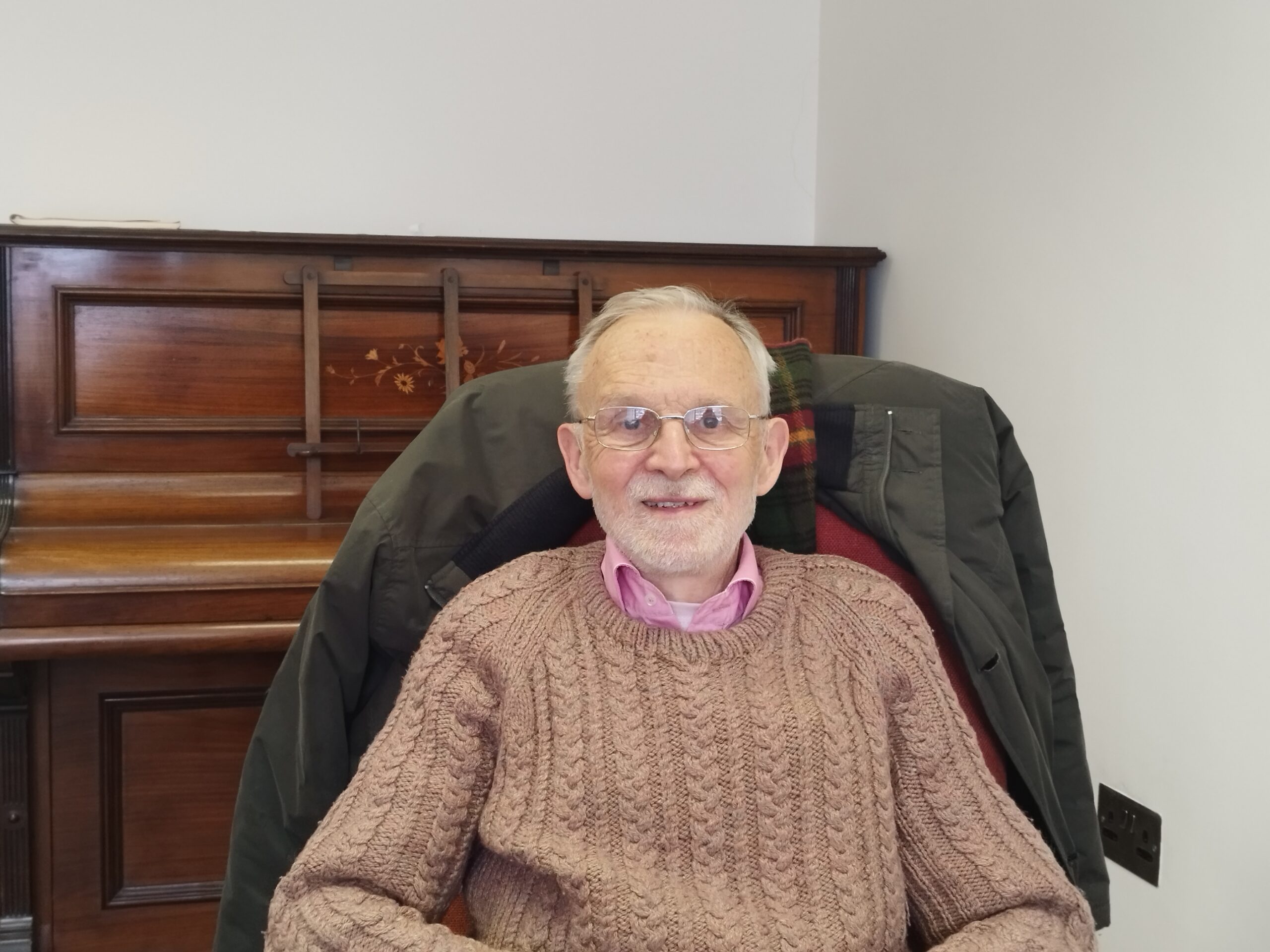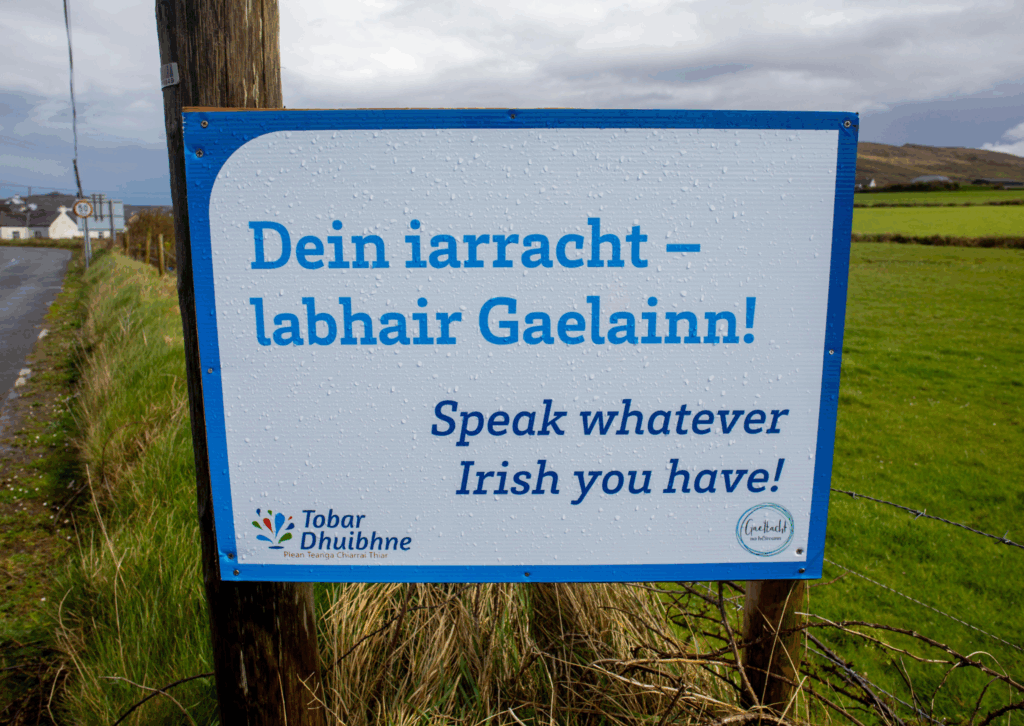
An interview with Frank Brady SJ on the Irish language and renewing ecosystems
“When I was in the Gaeltacht in West Cork,” Frank Brady recalls, “many, many people spoke English. But any time I spoke Irish, I was always answered in Irish.” That simple act of response – of being met where one is, i.e. in your own words – is, in Frank’s telling, not just a memory but a sign of something deeper. “It’s like there are shoots coming up,” he says, gesturing to a fragile but persistent resurgence of the Irish language in Ireland’s cultural soil.
Now in his eighties, Frank has spent decades weaving his Jesuit vocation with grassroots language work, often in the most unexpected corners. He has worked among the burgeoning Irish-language scene in West Belfast, and he has edited An Timire, the world’s longest- running Irish-language magazine.1 Yet for all his institutional involvement, Frank is adamant that the future of the Irish language – and its spiritual and social meaning – does not lie just in top-down policy but in grassroots gathering, joy, and mutual nourishment.
“I’ve always loved being among ordinary people,” Frank says. “And if you like, because I had the
language, that’s the way I went. Many of them have chosen the riches of that language for their
children. And I think they’re right to do so.”
He describes a layered “ecosystem” – a term he returns to often – where Irish is not merely a tool for communication but a medium for connection, culture, and shared value. There are urban Gaelscoileanna started by working-class parents in Belfast, summer language camps where teenagers take their first steps away from home and toward self-expression, and pub sessions where twenty people gather to sing songs in Irish and English, laugh, and remember. These aren’t grand projects. But they are enough to nourish a language.
“The ecosystem is weak,” Frank admits, “but it’s also alive. It finds its way back into existence.”
That language, he insists, carries a distinct way of seeing the world – a “richness” that speaks of human life, dignity, and community. It is, in his words, “part of the good things of the world,” something passed on through generations, something that resists both erasure and commodification. Frank sees this not as nostalgia, but as a justice issue: “Most of the world is multilingual,” he notes, “and in a democracy, if the people want it, the politicians must listen. We will continue to promote it.”
He sees hope not as wishful thinking but as a grounded response to reality: “There is reason to think that people value goodness and nourishment and richness. And the Irish language gives that.”
As we spoke, the conversation moved again and again to people gathering – around songs, in classrooms, at wakes, in churches. Frank has no interest in language simply as a heritage item. He wants to see it lived. “If people have no opportunity to gather, the language fades. But if you give people a reason to gather – something joyful, something rooted – then the language comes with it.”
In Laudato Si’, Pope Francis introduces the concept of cultural ecology as a critical part of integral ecology.2 Just as biodiversity sustains the planet’s resilience, cultural diversity sustains our human capacity to relate meaningfully to the world. Language, in particular, is a vessel of memory, worldview, and moral insight. When languages are lost, we lose entire ways of seeing.
In this context, minority and indigenous languages are not luxuries but vital assets – entrusted to specific communities and traditions, yet held for the common good. Irish, as Frank testifies, is one such language. It encodes a relational, communal, place- based imagination, shaped by land, history, and struggle. Supporting its cultivation is not only a matter of national pride, but of ecological and social justice.
Frank often references the work of translator and academic, Michael Cronin, whose classic book An
Ghaeilge agus an Éiceolaíocht / Irish and Ecology he was instrumental in seeing published.3 “He connects the language in a novel way with the whole question of ecology,” Frank says. “It opened up something.” For Frank, Cronin’s work names what he has long felt – that Irish offers a distinctive way of being in the world, rooted in place, rhythm, and relation. The book, now in its third printing, has helped reframe the language revival not simply as cultural preservation, but as ecological imagination.

Here, the Jesuit commitment to a “faith that does justice”4 meets the call of Laudato Si’: to protect not only species and habitats, but also the human cultures that help us understand and care for them. In a time of ecological collapse and linguistic homogenisation, Frank Brady’s witness points us to a deeper solidarity – from the ground up.
It is this incarnational instinct – to go where people are, to speak in the language of their hearts – that Frank sees as central to both his Jesuit vocation and his love for Irish. And just as Pope Francis insists that “everything is connected,” Frank has come to see that the movement to protect minority languages is
inseparable from ecological and social justice.5
“If we don’t look after the planet, there’ll be no place to live,” he says. “And the first people to suffer are the poor. It’s the same with language. The people who send their kids to Gaelscoileanna – they’re often normal working families. They want their children to have what Irish has to offer them. And that includes a
value system.”
In this sense, cultivating the ecosystem around the speaking of Irish goes deeper than the language itself. That “deeper” is difficult to define, but Frank gestures toward it through memory and place: the “something different” he first found in the homes of neighbours in rural Wicklow; the “treasure” he sensed in Irish-language primary schools during decades of chaplaincy; the particular joy of children preparing for sacraments through songs and stories “half in Irish and half in English.”
In a culture obsessed with scale and speed, Frank’s witness reminds us that transformation often begins in the slow work of tending – language, land, relationship, community. Laudato Si’ calls this an “integral ecology”: a worldview that sees no separation between the cry of the earth and the cry of the poor, between endangered ecosystems and endangered cultures.6
Frainc Mac Brádaigh SJ, quietly and faithfully, has lived this ecology. Not through grand strategies, but through presence, through speech, through a love that lingers where others might pass by. The language lives on – not because it is mandated, but because it is loved. And because, from the ground up, people still believe it matters.
Tending to the Irish language, like tending to our environment, is a way of honouring the fragile, the local, and the inherited – reminding us, as Laudato Si’ teaches, that true ecological renewal begins with learning to love what is already around us.
- An Timire/FS: https://www.timire.ie/ ↩︎
- Pope Francis, Laudato Si’ (Vatican City: Vatican, 2015), §143–46. ↩︎
- Michael Cronin, Irish and Ecology/An Ghaeilge Agus an Éiceolaíocht (Dublin: Foilseacháin Ábhair Spioradálta, 2019). ↩︎
- John W. Padberg, ed., ‘Our Mission Today: The Service of Faith and the Promotion of Justice,’ in
Jesuit Life & Mission Today: The Decrees & Accompanying Documents of the 31st–35th General
Congregations of the Society of Jesus (St. Louis, MO: Institute of Jesuit Sources, 2009), 298–316. ↩︎ - Pope Francis, Fratelli Tutti (Assisi: Vatican, 2020), §34. ↩︎
- Pope Francis, Laudato Si’, §139. ↩︎

